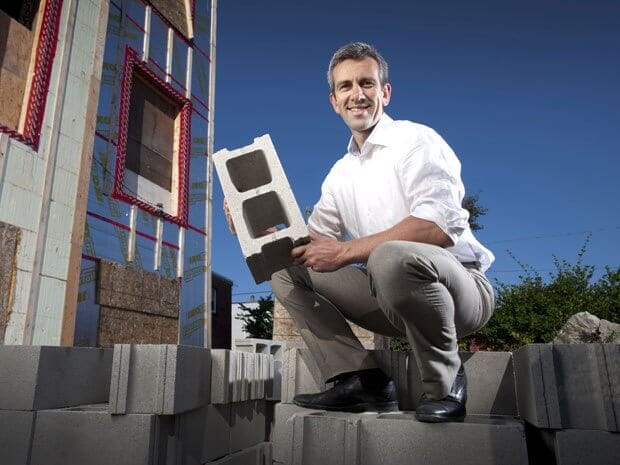Robert Niven at MaRS Mornings: The concrete path to a sustainable future

Robert Niven is an award-winning entrepreneur whose infectious charisma can get an entire audience excited about a seemingly ordinary topic: concrete. This Valentine’s Day, he took the stage at MaRS Mornings to share some of the lessons he’s learned along the way. Robert has evolved from chemist to engineer to CEO, and his company – CarbonCure – has taken a spot on the Global CleanTech 100 List multiple times.
CarbonCure is a Halifax-based venture that turns waste carbon dioxide (CO2) into concrete, permanently converting and recycling harmful CO2. The team see carbon dioxide as an opportunity, rather than just a waste product. This new concrete cures quicker, yields at a higher strength, and is priced competitively on the market.
The growing global demand for concrete, paired with local policies encouraging carbon offset, has helped CarbonCure to thrive both nationally and internationally. But, what else has driven the company forward? Robert highlighted seven takeaways for up-and-coming entrepreneurs at MaRS Mornings.
Tips for entrepreneurs
- Most of the clichés that you hear about the importance of building and nurturing your team are true. Finding and growing the right people really is the most important part of your journey and the health of your team environment is crucial. Select individuals wisely and cut ties quickly when needed. Nurturing your talent is critical. Air out any politics and confront issues as quickly as possible.
- Always welcome helping hands. When you find a great mentor, be sure to nurture that relationship as well. Rob had the privilege of being coached by Don Pinchin and Dave Green, two environmental entrepreneurs he met through serendipitous encounters. These two mentors helped him evolve his technical chemistry and engineering foundations, allowing him to mature into the entrepreneur he is today.
- If you love your company, give it the IP it deserves. Do a patent scan as soon as possible and make sure you get referred to the right patent lawyer. You can hire more people, you can raise more capital, but if you don’t protect your IP, then your venture cannot prosper.
- Technology is constantly evolving, so recognize that you’re not going into the marketplace with a perfect product. Get into your market quickly and design ways to collect data on failures and successes. This is critical so that you can validate whether or not your product is working. However, it is important to be perfectly honest with yourself. If your product isn’t working, kill it and do it quickly.
- Be strategic about how you bring in investors. Bootstrap in the beginning. Rob and his founding partners had a consulting business on the side to raise capital for the research and development arm of their product. You can always negotiate better deals when you have a higher valuation. Make sure you share any exciting news about the progress of your venture. Build relationships with investors in a strategic manner.
- Your business model will change just like your technology. At CarbonCure the technology worked, but sales were slower to take off. This was when the team had a “lightbulb moment” – to start selling “infrastructure as a service (IaaS).” These IaaS models were accredited to help give the solar industry early momentum in its formative years.
- At first, growth is about growing your team. When you transition into the scaling phase of your business, growth becomes all about building your partnerships. This ultimately boils down to how win-win situations can be aligned across multiple parties.
Interested in getting some more tips from Energy & Environment entrepreneurs? Ecobee’s Stuart Lombard shared some insights at MaRS Mornings in 2016. Take a look at his thoughts.
 Alanna Komisar
Alanna Komisar